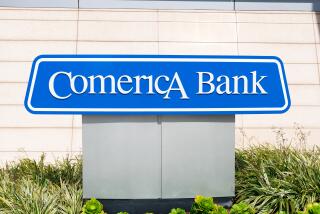Texas Posts Record 27th Bank Failure for Year
- Share via
HOUSTON — For the third year in a row, Texas set a national record for bank failures, exceeding last year’s total of 26 with six months left to go.
Federal regulators, citing poor management and bad loans, closed Texas National Bank-Westheimer of Houston late last week. It was the 27th bank in the state to be closed this year.
The 1986 toll also set a national record. In 1985, Texas set the national pace with 12 failures. So far this year, 82 banks have been shut down nationally, well over half the 140 closed last year.
With more than 2,000 banks, Texas has about 14% of the nation’s financial institutions, state officials say.
The banks closed in Texas this year had combined assets of about $881 million, including $27.5 million from the Houston bank, Federal Deposit Insurance Corp. figures show.
Some state banking figures, however, believe the end is near for the state’s bank-bust cycle.
“The state is beginning to bottom out,” said Gerald Fronterhouse, chairman and chief executive of RepublicBank Corp. “The whole economy will begin to accelerate again and that will help the banks.”
Harvey Rosenblum, vice president and director of research at the Federal Reserve Bank of Dallas, also gave an upbeat assessment of the outlook for banks and savings and loans, but said change may not come quickly.
“I think it’s going to get worse first,” Rosenblum said.
Lowell Smith Jr., president of the First State Bank in Rio Vista and president of the Texas Bankers’ Assn., said that although there may be too many banks in some areas of the state, conditions are expected to improve.
“I’m confident things will look up,” he said. “I hope that we would not have to have the marketplace take care of it that violently.”
Texas National Bank-Westheimer, which was chartered in March, 1985, became of concern to the comptroller’s office in 1986, according to Robert J. Herrmann, senior deputy comptroller of the currency.
The bank tried to grow quickly by generating a high volume of loans supported by high-cost deposits gathered from outside the bank’s market area, he said.
Liberal lending practices, poor administration and supervision of the loan portfolio by former bank officers resulted in excessive problem loans.
The practices, coupled with inadequate oversight of the bank by the board of directors and the weak local economy, caused the bank’s financial condition to deteriorate, Herrmann said.
The FDIC was appointed receiver of the bank’s assets, which were then transferred to Texas Capital Bank-Westwood, another one-branch Houston bank.
More to Read
Sign up for Essential California
The most important California stories and recommendations in your inbox every morning.
You may occasionally receive promotional content from the Los Angeles Times.













